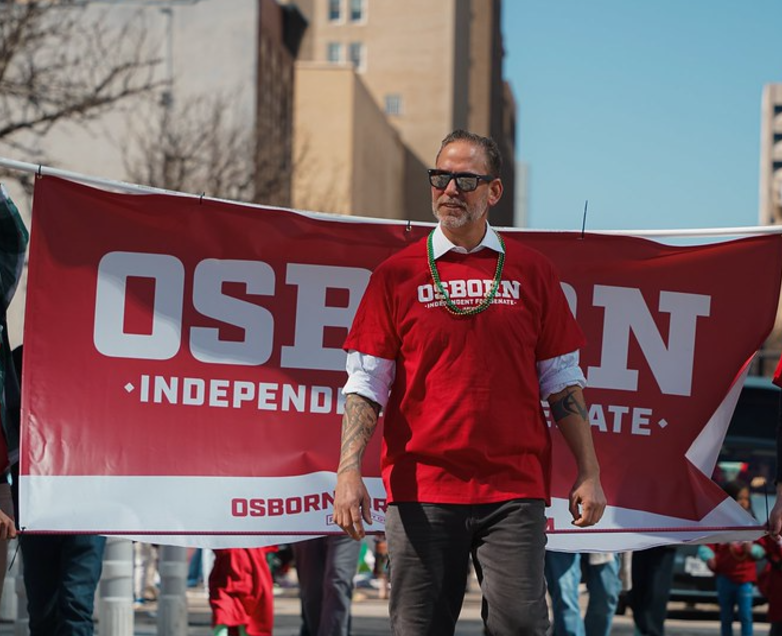The 2024 elections were, without question, a catastrophe for the Democratic Party. Between Vice President Harris losing convincingly and losing control of the Senate – which includes Dave McCormick’s upset win over Incumbent Senator Bob Casey – there were effectively no bright spots for Democrats. As I mentioned in my previous article, for the Democratic Party to regain support from the groups and voting blocs they saw dwindle in 2024, there must be an immediate change in the overriding ideology of the Democratic Party. Fortunately, one independent candidate for the U.S. Senate in Nebraska, Dan Osborn, may have a blueprint for the future of the Democratic Party if they seek to remain viable.
Dan Osborn, a mechanic and former union leader, was the Independent nominee for the U.S. Senate election in Nebraska. Despite Trump winning Nebraska by over 20 percentage points in the 2024 elections, Dan Osborn made his race against incumbent Deb Fischer much closer, losing by roughly 6.5 percentage points. It is true that Osborn didn’t win this race, which may make one question why I view his campaign as a blueprint for the Democratic Party. However, once you consider the Nebraska Senate Special election that occurred on the same ballot, one in which Pete Ricketts won by nearly 25 points, it becomes clear that Osborn was a heavy overperformer, and his ideology was much more palatable to urban, suburban, and rural voter across Nebraska.
Dan Osborn’s platform was closely aligned with a center-populist ideology with a left-leaning, labor-oriented tilt. Osborn ran on an economically left-leaning, socially moderate platform, once in which he explicitly expressed support for economically left-leaning policies, including raising the minimum wage, prioritizing tax cuts for the working class and lower-income households specifically, and, of course, strong support for labor unions and workers’ rights. On the social side, Osborn ran on a combination of socially left-of-center and socially right-of-center positions. On the one hand, Osborn is a supporter of gay marriage, legalizing and regulating marijuana, and supporting a mechanism for some illegal immigrants to have a pathway to citizenship. On the contrary, Osborn supports increasing border security – including support for some form of a border wall, supporting police officers and law enforcement, and defending and protecting the Second Amendment. On the issue of abortion, while Osborn’s campaign platform was somewhat vague in providing a specific restriction – something I dislike from any candidate, including Osborn – he also explicitly stated that he didn’t support “extreme national measures to ban abortion.” Other sources suggest that Osborn would support a bill protecting abortion up until fetal viability. While this specific position is more socially progressive than I’d prefer, the difference between supporting a restriction between 16-20 weeks and one at 21-23 weeks likely wouldn’t cause a massive shift in votes.
Osborn also represents a style of politicians that Democrats desperately need to replicate. The Democrats have quickly become viewed as the party of the elite – with many viewing them as arrogant, elite, Ivy-league graduates who think they’re more intelligent and more sophisticated than the average American. This is undoubtedly a characterization that Democrats should quickly seek to quash, and someone like Osborn would do just that. This isn’t simply about the aesthetics of the candidate, and Dan Osborn’s background as a mechanic, alongside his slightly more casual attire, doesn’t hurt when trying to avoid the elite, arrogant stereotype. However, this is far from enough. Osborn rarely ever bragged about his accomplishments. He never painted himself in a “holier than thou” light nor insinuated that he was more intelligent than his constituents. He did a significantly better job of aligning himself as an equal among his constituents, something that Democrats seem to struggle with, both in 2024 and in the past several years. The aesthetic aspect is difficult to replicate successfully, as one must avoid looking fake or inauthentic when attempting to differentiate oneself from the elite or the establishment. However, a simple attitude switch, such as quashing the elitist attitude, would be a significant improvement.
While not a perfect candidate in by any means – which is practically impossible due to how subjective a “perfect” candidate is – Dan Osborn represents a type of politician that was once common within the Democratic Party, especially throughout the Midwest. These politicians had heavy support among working-class, rural voters while maintaining considerable support in the suburban and urban regions. Because of political polarization, it is not likely that we will ever observe a 2008 Charlie Wilson performance in Ohio’s 6th congressional district again. Yet, there is still a path for the Democratic Party to regain, at minimum, some of the support they once held. Osborn’s ideology represents a syncretic platform that is uncommon among modern-day politicians but also quite popular among the national electorate. Most Americans express support for a number of economically progressive ideologies – from raising the federal minimum wage to supporting some form of affordable healthcare. On social issues, supporting gay marriage and weed legalization appears to be supported by a clear majority, or are at least not positions that most people consider as one of their most important concerns even if they oppose these positions, while supporting the 2nd amendment and border security are also supported by a majority of Americans. I continue to remain unconvinced that the Democratic Party will embrace an ideological change like this, which will continue to leave people disaffected from the Democratic Party, including myself. If they are willing to embrace such change, I believe there will be a much bigger chance for Democrats to rebuild the coalition of voters they once had.
